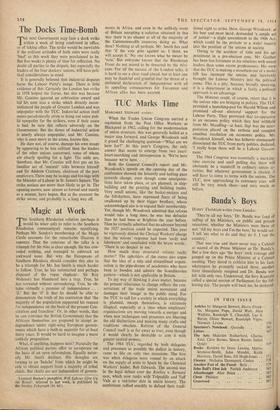TUC Marks Time
MARGARET STEWART writes: When the Trades Union Congress carried a resolution from the Post Office Workers at Blackpool in 1962, calling for the modernisation of union structure, this was generally hailed as a major step forward, and George Woodcock said it posed the challenging question—'What are we here for?' At this year's Congress, the only answer that seems to emerge from two years' heart-searching and introspection is, 'We're here because we're here. .
Both the General Council's report and Mr. Woodcock's speech on the opening day of the conference showed the leisurely and halting pace towards change, even though some amalgama- tions have taken place, or are planned, in ship- building and the printing and building trades. Very small unions, like the basket-makers and the felt-hatters, have expressed fears of being swallowed up by their bigger brothers, whose acknowledged aim is to expand their membership. Yet, though Mr. Woodcock admitted that reform would take a long time, he was less defeatist than he had been at Brighton the year before. Then he virtually admitted that no advance beyond the 1927 position could be expected. This year he vigorously denied the Clerical Workers' charge that the unions' response had been 'tardy and lukewarm' and concluded with the brave words: 'There is no despair in me.'
How much does structural reform really matter? The upholders of the status quo argue that the idea of a tidy and streamlined organi- sation is the pipe-dream of academics who have been to Sweden and admire the Scandinavian pattern—which is not applicable in Britain.
To my way of thinking it does matter, because the present reluctance to change reflects the con- servatism of the trade union movement and damages their 'image' in the public mind. For the TUC to call for a society in which everything is planned, except themselves, is extremely illogical, especially at a time when employers' organisations are moving towards a merger and when new techniques and processes are blurring the old distinctions and making many crafts and traditions obsolete. Reform of the General Council itself is as far away as ever, even though it would clearly be desirable to arm it with greater central powers.
The 1964 TUC, regarded by both delegates and pressmen as possibly the dullest in history, came to life on only two occasions. The first was when delegates were roused by an attack on the supply of arms to Spain by the Chemical Workers' leader, Bob Edwards. The second was in the legal debate over the Rookes v. Barnard case, which now ranks with Tolpuddle and Taff Vale as a red-letter date in union history. The conference rallied sturdily to defend their tradi- tional right to strike. Here. George Woodcock. at his best and most lucid, demanded 'a simple act of justice'—a slight amendment to the 1906 Act, which could be the prelude to a wider inquiry into the position of the unions in society.
Owing to the accident of time and his ap- pointment in a pre-election year, Mr. Godber has been less fortunate in his relations with union leaders than some recent predecessors. His view that the TUC is making a mountain out of a mole- hill has incensed the unions and inevitably brought the Labour Ministry into the political arena. This is a pity, because, broadly speaking, it is a department in which a fairly a-political approach is an advantage.
The Minister could, of course, retort that it is the unions who are bringing in politics. The TUC provided a launching-pad for Harold Wilson and promised all-out electoral support for the Labour Party. They promised that co-operation in an incomes policy which they had withheld from Mr. Maudling—at least, thy was the inter- pretation placed on the verbose and complex omnibus resolution on economic policy. Mr. Woodcock himself, who has hitherto strenuously dissociated the TUC from party politics, declared, 'I really hope there will be a Labour Govern- ment.'
The 1964 Congress was essentially a marking- time exercise and until polling day there will obviously be a standstill in ordinary union ac- tivities. But whatever government is elected, it will have to come to terms with the unions. The TUC, now approaching its centenary year, will still be very much there—and very much as before.


































 Previous page
Previous page